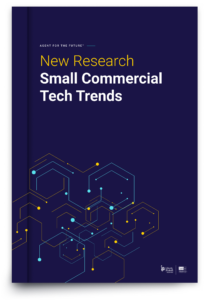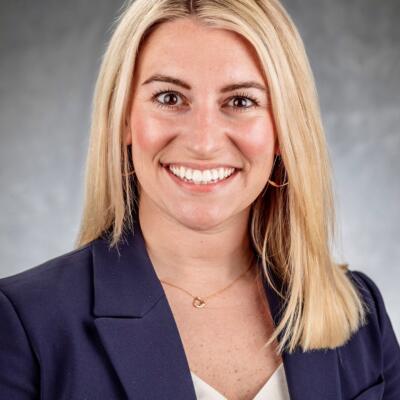Small commercial insurance is reaching a digital tipping point.
As carriers, InsurTechs and agencies drive more digitalization across the policy lifecycle, small commercial insurance is starting to look and feel more like personal lines. New technologies are harnessing third-party data to streamline quoting, predict coverage needs and get ahead of changing risks, while automated processes and digital communication channels are changing how agents interact with clients, who increasingly expect cohesive digital experiences.
These technologies signal a departure from the highly manual processes of the past. These changes can benefit agents and help them build even stronger relationships with clients and carriers. In fact, research from Liberty Mutual found that making the right tech investments for operating efficiently is one of the top business practices that drives growth for agencies that focus on small commercial clients.

Read our latest research report to learn how small commercial agencies are using digital tools to grow. Read it here.
Savvy agents view evolving technology as an advantage instead of a threat. Every business has different risks, and commercial insurance can be complex and confusing for business owners. Independent insurance agents are trusted advisers to business owners navigating those complexities, bringing peace of mind by ensuring that businesses are properly covered.
Digital tools cannot replace the expertise that agents bring or the relationships they build with clients. But agents can lean on digital tools to make their work more efficient, enhance their knowledge and find new opportunities.
Here are some of the ways digitalization is transforming small commercial, and what it means for agents:
1. The Rise of Comparative Raters
Comparative raters have been widely used in personal lines for more than a decade but are relatively new for commercial lines.
Personal risks tend to be fairly black and white. While there is some variation in risks, generally a home is a home and an auto is an auto, and there is a standard set of questions carriers ask to generate a quote. Personal lines agents can enter customer information into a comparative rater and get quotes from multiple carriers within minutes.
Commercial insurance lives in a grayer area. A restaurant is going to have different risks and coverage needs from a construction company or a clothing store. The questions on applications for each of those businesses are going to be different. Even commercial auto policies are more complicated than personal auto policies—many of us saw the pain points with that as more businesses and restaurants started relying on third-party delivery during the pandemic.
On top of that, carriers have different appetites for what types of businesses they cover, so it can be difficult to find a market that matches the need.
Even as carriers moved away from paper processes, getting multiple quotes for a commercial policy was time-consuming, requiring agents to manually enter data into each carrier portal.
Thankfully, new technology is automating more of those processes and making it much easier and faster for commercial insurance agents to obtain multiple quotes. While the questions still differ between business types and carriers, new tools pull together the commonalities and let agents enter information into one place to obtain multiple quotes instead of having to get each quote individually.
Commercial comparative raters are still more complex than personal lines raters, but they are much more efficient than previous processes. As the tools continue to improve, we’ll see increased adoption of quoting platforms for commercial insurance.
2. AI, Third-Party Data Prefills and Predictions
There is an abundance of data available in the commercial insurance world, but that data hasn’t always been accessible to agents and brokers. Personal lines data tends to be fairly straightforward—companies can run a credit check on an individual or look up a house on a real estate website to get detailed information about the structure. Tracking down detailed information on business activities and assets can be more of a challenge, and those areas can often evolve or change.
Commercial insurance agents and underwriters typically had to do a lot of back and forth with business owners to learn about their business and find the proper coverages. This process is time-consuming. A report from Accenture found that underwriters spend up to 40% of their time on non-core and administrative activities.
However, new technology is creating better ways to harness third-party data and use it to predict risk types, class codes and coverages. Using just a business name and address, these tools can crawl business websites, Google, Yelp and other sources for data. Artificial intelligence is often used to prefill forms, predict North American Industry Classification System (NAICS) codes and suggest which coverages will be needed to properly insure the business.
These technologies remove a lot of the manual labor that has typically gone into the quoting and submissions process. Automating the time-consuming back end and administrative processes will make the sales cycle for small commercial insurance less complex. As data helps streamline the process, agents will be able to focus more time on helping clients navigate complex risks.
Data tools can also help agents have more productive conversations with clients. Armed with prefilled forms, they can spend their time verifying the information, uncovering other business risks that may not have shown up in the data and fine-tuning coverages.
Agents play an important role helping customers navigate all the data that is out there about their business. Not all data on the internet is reliable, and the small commercial space has more subjective data, such as customer reviews, than the personal lines space. Agents can talk with carriers to make sure that bad data, such as false information from a fake review, doesn’t negatively impact their client’s insurance options.
3. Proactive Communication About Evolving Risks
The pandemic highlighted how businesses can evolve in unexpected ways. For example, in recent years, mobile pet grooming trucks started popping up everywhere. Since customers didn’t want to take their pets out of their homes to get them groomed, companies started coming to their clients.
From an insurance perspective, that brings a whole different set of risks from the way the business originally operated. Insurers had to quickly adapt to ensure clients were covered for the new ways of doing business.
That’s one small example of how risks evolve, but it demonstrates why agents can’t only touch policies at the time of renewal. They need to stay informed about evolving risks to ensure clients are properly covered—whether that’s by account rounding, upselling or remarketing the policy with a different carrier.
New technologies are helping by giving carriers and agents more insight into changing risks. Technology can help agents proactively communicate with clients about how things are changing. There is a lot of talk about proactive remarketing in personal lines insurance, and that is becoming more common in the commercial lines space, as well. More agencies are investing in robust processes and teams to support remarketing and retention for their commercial clients.
4. Using Digital Marketing for Prospecting
A recent survey of independent commercial insurance agents by TrustedChoice.com and Semsee found that most agents still heavily rely on referrals and personal connections to find new clients. However, commercial lines agents expect to see more customers shopping online for insurance within the next three years. Forward-thinking agencies are adapting to that and getting smarter about their prospecting strategies.
Agents today have opportunities to reach a countrywide audience of potential clients. And today’s consumers are used to doing business online. In the past, consumers wouldn’t feel as comfortable working with an insurance agent that lived across the country for their commercial insurance needs, but the world has changed. We have all gotten more comfortable doing business with people we have never met face to face. If anything, that is more of a norm in the world we live in—think Carvana, Redfin and telemedicine.
Research from Liberty Mutual shows that the top commercial agents are leaning on these tools. Commercial insurance agents are more likely than personal lines agents to use video calls with their clients and prospects. The research showed that fast-growing small commercial agents were more likely to be leveraging the internet for marketing, using tools such as search engine optimization (SEO), social media, live online chat and self-service portals.
Digital marketing tools also give agents a lot of data about where new business comes from. They can see which tactics are most effective and make strategic decisions about where to invest.
5. More Specialization
Since everyone can reach a wide audience, it becomes even more important for agents to find ways to set themselves apart. And with automation driving efficiencies in the standard lines of business, agents have more time to focus on more complex markets.
The best agents specialize capitalizing on a growing niche market. By homing in on a niche, agents can make themselves subject-matter experts. They become the go-to person who understands the risks and coverages and has good relationships with carriers who cover that market. Business owners seek out that kind of expertise and trusted advice.
For example, maybe an agent really enjoys working with restaurant owners and decides to make that their focus. They can dive into learning all the complexities of risks restaurants might face so they can talk with restaurant owners in their own language. They can also use their niche to build strong relationships with carriers so they know the options for where to place business. They can brand themselves as an expert online and use digital marketing tools like SEO to reach restaurant owners and drive leads from around the country.
What Does This Mean for Agents?
The digitalization of small commercial insurance is rushing forward, but digital doesn’t replace or diminish the value that independent insurance agents bring. New technology tools can help agents deliver that value to their clients.
Small commercial clients are used to purchasing most products and services online, including, in some cases, their personal insurance policies. Their expectations will continue to evolve. They will expect more digital interactions and efficiencies as they purchase and manage their commercial insurance, as well. Using the technology tools will enable commercial insurance agents to meet those expectations and compete in an increasingly online world.
This article was originally published in IA magazine. Reposted with permission.





Great article!